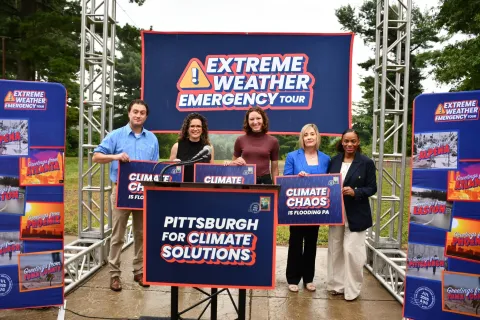Rep. Summer Lee Joins Local Leaders for Extreme Weather Emergency Tour to Spotlight Flooding Threat, Federal Cuts to Resilience Funding
Event highlighted how climate-fueled storms and infrastructure failures are endangering lives, draining local resources
PITTSBURGH, PA – AUGUST 13, 2025 — Today, Congresswoman Summer L. Lee (PA-12), along with environmental experts and community leaders, gathered at Boyce Park for a press conference as part of the Extreme Weather Emergency Tour. The national effort spotlighted how the burning of fossil fuels is leading to climate change which is contributing to extreme weather becoming more frequent and more severe resulting in dangerous and more costly weather events in Pittsburgh and across the United States.
Speakers addressed the rising toll of flash flooding and storm-related power outages in Western Pennsylvania, including recent storms that claimed lives and caused extensive damage in the Pittsburgh area. Attendees drew attention to how federal cuts to key climate and infrastructure programs—including the termination of a $5.33 million FEMA grant and the EPA’s environmental justice initiatives—are leaving residents more vulnerable to disaster.
Officials also warned that the Trump administration’s rollbacks of pollution protections, including the proposed weakening of the Clean Power Plan and rolling back the EPA’s Endangerment Finding, threaten to further worsen the climate crisis and make flooding and other extreme weather more deadly and frequent.

Congresswoman Summer Lee emphasized the federal government’s responsibility to partner with state and local leaders in preparing for stronger, more frequent storms. “The late April storms left many in our region without power for days—some for more than a week—and exposed the gaps in our storm infrastructure,” said Rep. Lee. “We need stronger federal investment in grid resilience, in mitigation and emergency response, and in the agencies like NOAA and the National Weather Service that keep us informed and safe. That means making sure residents
have the information they need before disaster strikes, and ensuring first responders have the tools to support communities during and after an event. We must also accelerate clean energy investments to reduce the carbon pollution that is fueling climate change that is contributing to increasingly destructive extreme weather.”
Amanda Settelmaier, Executive Director of the Turtle Creek Valley Council of Governments, spoke about the strain severe storms are placing on local governments. “When emergencies happen, residents turn to their local officials for help. But more frequent, more severe storms are overwhelming the systems we’ve relied on for decades,” said Settelmaier. “Smaller municipalities often lack the staff capacity and resources to respond adequately, and residents don’t always have the means to prepare for prolonged outages. The quality of emergency response shouldn’t be dictated by zip code. Our communities need more resources, not less.”
Emily Zuetell, Ph.D. Student at Carnegie Mellon University, Engineering and Public Policy/Civil and Environmental Engineering, underscored the urgent need for long-term resilience planning. “We designed our infrastructure decades ago for failures that might happen once in a generation, not multiple times a year,” said Zuetell. “Climate change is fueling more frequent and more destructive storms, and the cost of inaction will only grow. We need to invest now in resilient power systems, flood protections, and other safeguards so our communities can withstand the challenges ahead. The time to account for these risks and plan for the future is now. It is reckless for the federal government to withdraw resources from our communities, as well as from the agencies tasked with understanding the science that can help protect residents from the destructive power of extreme weather. Failing to deliver these resources will lock-in inadequate infrastructure that can't withstand the next generation of extreme weather, leaving our communities vulnerable for decades to come."
This summer, CAC’s Extreme Weather Emergency Tour is putting a spotlight on how climate change is making extreme weather more frequent, more intense, more costly, and more deadly. The tour is making stops in four states – Arizona, Michigan, Pennsylvania, and Georgia – detailing the impacts worsening heat, storms, wildfires, flooding, and other extreme weather events are having on communities, especially our most vulnerable communities.
The tour is especially calling attention to the Trump administration’s rollbacks of climate protections, and how alarming attacks on agencies like FEMA and NOAA are exacerbating extreme weather and weakening disaster preparedness and response. Speakers on the tour will showcase solutions to the pressing problem of extreme weather, highlighting the importance of pollution protections, clean energy incentives, and more.
A recording of the event is HERE.
Congresswoman Summer Lee serves on the House Committee on Oversight and Government Accountability and the Committee on Education and Workforce. Since taking office in January 2023, she has delivered historic levels of federal investment totaling over $2.4 Billion brought back to Western PA, including over $580 million for infrastructure, over $110 million for affordable transit, over $500 million to keep clean energy manufacturing at home in Pennsylvania, and over $55 million on clean energy efforts in and around schools to help keep our kids and communities safe. These investments will help improve Western Pennsylvania’s infrastructure and transit, ensure cleaner air and drinking water, lower housing costs, fund research institutions, fuel clean manufacturing, fund STEM innovation and entrepreneurship, boost workforce development, and create thousands of good paying union jobs. Lee and her team have also delivered casework and constituent services to over 3,000 constituents with issues ranging from helping our seniors and disabled community access Medicare and social security to helping folks secure housing and helping families with immigration support and passports.